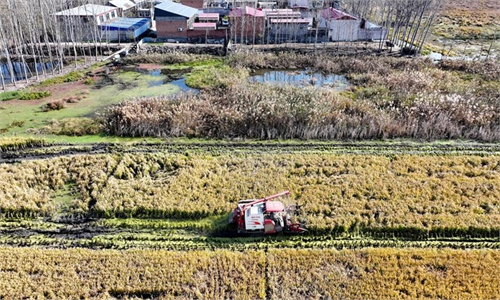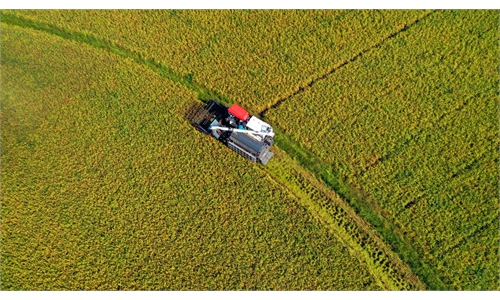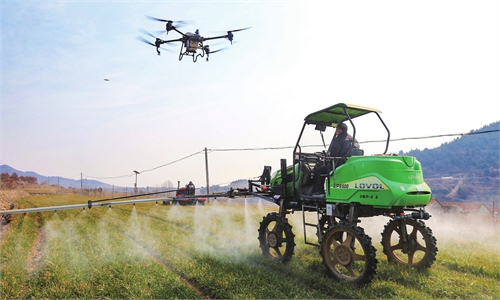
Illustration: Xia Qing/GT
Northwest China's Xinjiang Uygur Autonomous Region grabbed the top spot in the country in terms of grain yield per unit area in 2024, marking a new breakthrough in the region's efforts to enhance grain production, the Xinhua News Agency reported.The Xinjiang region has not only firmly secured its own food supply, but it has also made contributions to the national grain supply. This serves as a testament to the improvement of living conditions and production levels in the region, which stands in stark contrast, and a strong rebuttal, to the narratives fabricated by some politicians in the West to smear the region.
Xinjiang's average grain yield per mu this year soared to 524.8 kg, or 7,872 kg per hectare, 130 kg higher than the national average and the highest per-mu grain yield among the country's provincial-level regions, according to data from the regional agriculture and rural affairs bureau, Xinhua reported.
This achievements in raising grain yield in the Xinjiang region have not been easily attained. They are the result of a comprehensive and consistent interplay of policies, technology and other positive factors.
In recent years, the Xinjiang region has focused on establishing itself as an important supply base for high-quality agricultural products in the country. This has been achieved by adjusting the planting structure, tapping into the potential of water resources, increasing arable land area, and strengthening policy and technological guidance, while making every effort to ensure the production of grain.
Relying on technological support to improve per unit yield had already been one of the key focuses of agricultural work in the region for 2023, the local media Xinjiang Daily reported in March. In 2023, Xinjiang achieved a new high in total grain production, with various local areas leveraging scientific and technological support to increase per unit yield. This collaborative effort led to an overall enhancement in grain yield levels throughout the region.
With the continuous advancement of modern technology, the agriculture sector in the region is actively applying new technologies to improve production efficiency and product quality. This allows farmers to better manage their land and crops, enhancing the yield and market competitiveness of agricultural products.
In addition, increased investment in agricultural infrastructure has improved irrigation systems, transportation networks and storage facilities, thereby enhancing agricultural production efficiency and grain storage capacity.
The agricultural achievements in the Xinjiang region exemplifies China's efforts and progress to enhance its agricultural sector, reflecting the country's overall endeavors and accomplishments in pursuing agricultural modernization and sustainable development.
Through the success and practices in Xinjiang, China's continuous exploration and innovation in agriculture can be observed. With the further implementation of policies and continuous technological advancements, Chinese agriculture is bound to achieve even greater accomplishments in broader fields.
China's 2024 grain output hit a record high of 706.5 million tons, an increase of 1.6 percent from last year. This year also marks the first time that the country registered a grain harvest of over 700 million tons, according to Xinhua.
In 2025, China will vigorously promote the large-scale increase of grain yields, consolidate the achievements of expanding soybean and oilseed cultivation and make every effort to ensure the production of grain and oil, according to a national conference of officials from local agriculture authorities on Wednesday, Xinhua reported.
Given the escalating impact of climate change and natural disasters on global agricultural production, China's achievement in significantly increasing food production on just 9 percent of the world's arable land is commendable. This accomplishment, which supports about 20 percent of the global population, represents a substantial contribution to global food security.
China's dedication to enhancing per unit yield not only boosts food production but also fosters sustainable agricultural development by optimizing production methods and improving resource utilization efficiency. This approach will not only continue to strengthen China's food self-sufficiency but also contribute to global food security.
The author is a reporter with the Global Times. bizopinion@globaltimes.com.cn



